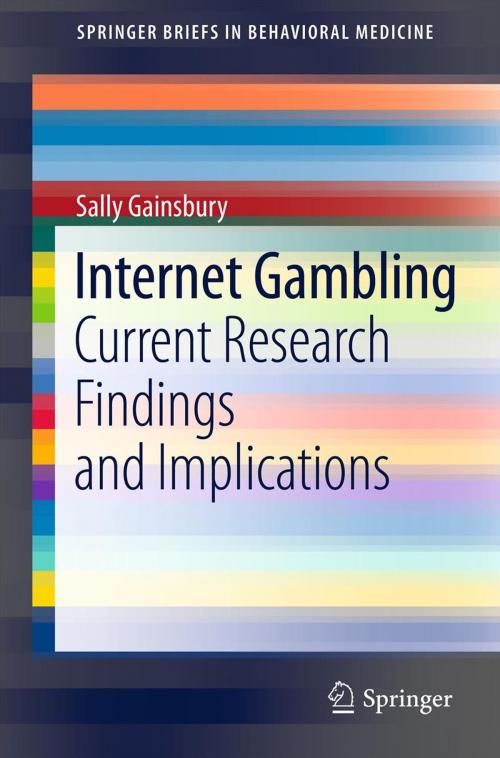Internet Gambling
Current Research Findings and Implications
Nonfiction, Health & Well Being, Medical, Reference, Public Health, Psychology, Applied Psychology| Author: | Sally Gainsbury | ISBN: | 9781461433903 |
| Publisher: | Springer New York | Publication: | March 2, 2012 |
| Imprint: | Springer | Language: | English |
| Author: | Sally Gainsbury |
| ISBN: | 9781461433903 |
| Publisher: | Springer New York |
| Publication: | March 2, 2012 |
| Imprint: | Springer |
| Language: | English |
Internet gambling is one of the fastest growing forms of gambling. Global Internet gambling expenditure is predicted to reach US$33.6 billion in 2011. This is higher than worldwide movie box office revenues and represents 9% of the international gambling market. The rapid increase in expenditure of 354% since 2003 has occurred despite Internet gambling being prohibited in several key markets, including the US and China. It also suggests that current regulation may be somewhat outdated and ineffective as more and more people turn to this mode of gambling. Internet gambling is highly accessible with over 2,400 sites available 24/7 through computers, mobile phones, wireless devices and even interactive televisions. Gamblers can now play casino games, bingo, cards and poker, bet on races, sports and even celebrity weddings using over 199 means of electronic payments without leaving the house. Increasing international jurisdictions are legalizing Internet gambling and the constant accessibility of online gambling has critical social implications. Gambling operators are using aggressive advertising campaigns to move into new markets. Internet gambling appears to be particularly appealing to youth, who are gambling online at substantially higher rates than adults. Furthermore, Internet gambling appears to be related to problem gambling, with rates of problem gambling three to four times higher among Internet than non-Internet gamblers, indicating that it may have a substantial social cost. The anonymity of online sports betting poses a significant threat to the integrity of sport at all levels with increasing allegations of match-fixing and cheating. Estimates suggested that 50% of all bets on the 2010 FIFA World Cup were placed online, worth an estimated £500 million. These figures represent a 700% rise in online betting since the 2006 tournament and included many new players that opened online accounts. It is essential that appropriate responses are made by governments, industry professionals and the public in response to Internet gambling. This book will provide a comprehensive and up-to-date overview of Internet gambling, including the social impact and regulatory options. A global outline will include the characteristics and features of the many forms of Internet gambling, including the current market, and participation, and differences between Internet and non-Internet gambling. Specific regional considerations will be explored including regulatory responses and options. Importantly, the social consequences and costs of Internet gambling will be examined, including the impact of online gambling on sports, youth and problem gambling. Strategies for prevention and responsible gambling will be considered as well as expected trends.
Internet gambling is one of the fastest growing forms of gambling. Global Internet gambling expenditure is predicted to reach US$33.6 billion in 2011. This is higher than worldwide movie box office revenues and represents 9% of the international gambling market. The rapid increase in expenditure of 354% since 2003 has occurred despite Internet gambling being prohibited in several key markets, including the US and China. It also suggests that current regulation may be somewhat outdated and ineffective as more and more people turn to this mode of gambling. Internet gambling is highly accessible with over 2,400 sites available 24/7 through computers, mobile phones, wireless devices and even interactive televisions. Gamblers can now play casino games, bingo, cards and poker, bet on races, sports and even celebrity weddings using over 199 means of electronic payments without leaving the house. Increasing international jurisdictions are legalizing Internet gambling and the constant accessibility of online gambling has critical social implications. Gambling operators are using aggressive advertising campaigns to move into new markets. Internet gambling appears to be particularly appealing to youth, who are gambling online at substantially higher rates than adults. Furthermore, Internet gambling appears to be related to problem gambling, with rates of problem gambling three to four times higher among Internet than non-Internet gamblers, indicating that it may have a substantial social cost. The anonymity of online sports betting poses a significant threat to the integrity of sport at all levels with increasing allegations of match-fixing and cheating. Estimates suggested that 50% of all bets on the 2010 FIFA World Cup were placed online, worth an estimated £500 million. These figures represent a 700% rise in online betting since the 2006 tournament and included many new players that opened online accounts. It is essential that appropriate responses are made by governments, industry professionals and the public in response to Internet gambling. This book will provide a comprehensive and up-to-date overview of Internet gambling, including the social impact and regulatory options. A global outline will include the characteristics and features of the many forms of Internet gambling, including the current market, and participation, and differences between Internet and non-Internet gambling. Specific regional considerations will be explored including regulatory responses and options. Importantly, the social consequences and costs of Internet gambling will be examined, including the impact of online gambling on sports, youth and problem gambling. Strategies for prevention and responsible gambling will be considered as well as expected trends.















